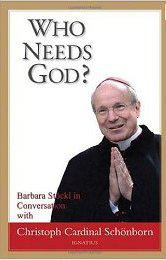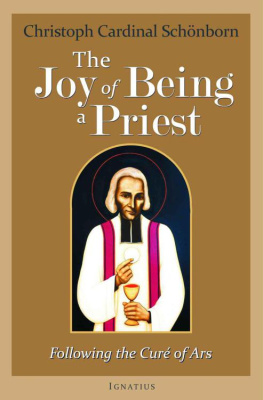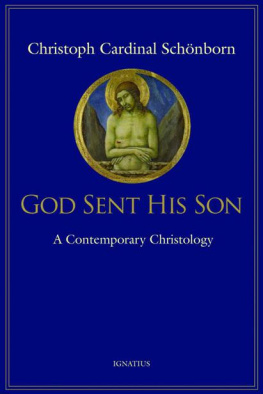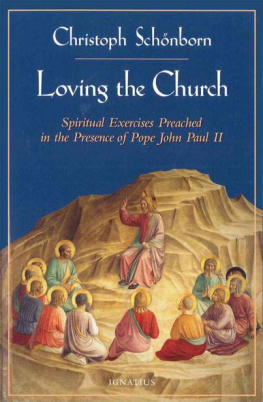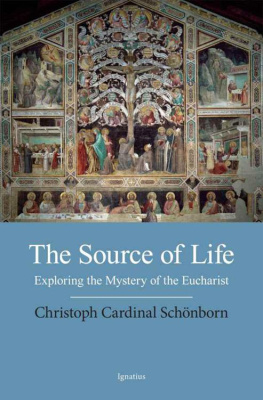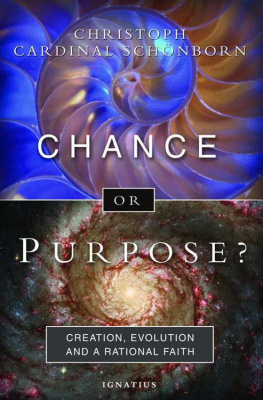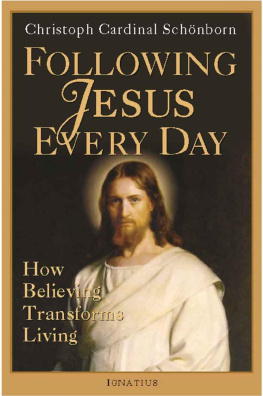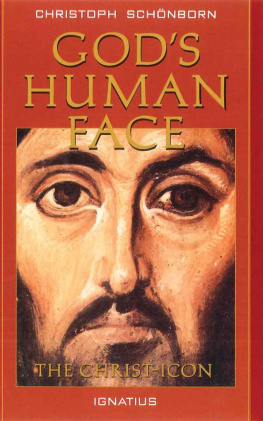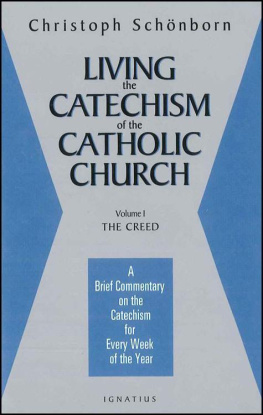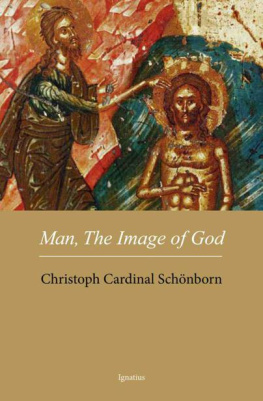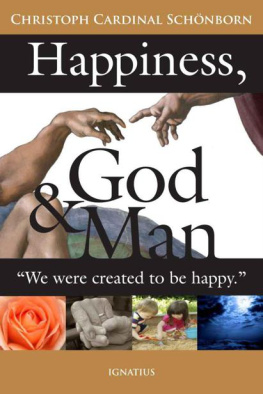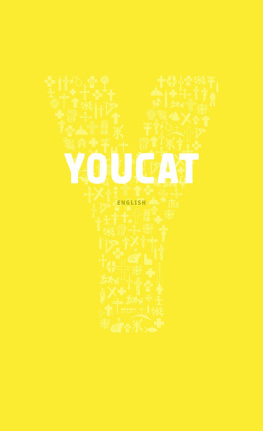WHO NEEDS GOD?

Christoph Cardinal Schnborn
Original German edition: Werbraucht Gott?
Translated by Henry Taylor
2007 by Ecowin Verlag, Salzburg
Cover photograph by Stefano Spaziani
Cover designed by Roxanne Mei Lum
2009 by Ignatius Press, San Francisco. All rights reserved.
ISBN 978-1-58617-284-8
Library of Congress Control Number 2008936289
Printed in the United States of America
When people stop believing in God,
they don't believe in nothing
they believe in anything.
(Often attributed to Gilbert Keith Chesterton )
CONTENTS
FOREWORD
The mathematician and physicist Blaise Pascal, who lived in the seventeenth century, proposed a wager with a friend as to whether there was a God or not. The friend thought there was no God. "What do I get if I win?" he asked. "Nothing", Pascal replied; "you may indeed be right, yet nonetheless you have lost. And I, too. If there is no God, then life is empty and meaningless." "And if you win?" the friend asked. "Then we have both won", said Pascal. That, his friend said, did not answer the question as to the existence of God. "Quite so," said Pascal, "but it makes it clear that you have to decide and that this decision has consequences for your life. You have to choose between two answers that have an equal probability of being right: one answer has good consequences, and the other dreadful ones. How can you hesitate?" The friend asked, "What if I am wrong?" "That makes no difference", said Pascal; "then you have enjoyed a lovely illusion. Otherwise, you would have been choosing nothingness. That does not make anyone happy." "Then I have to believe in God?" asked the friend. "You do not have to," replied Pascal, "but it is your only chance."
Nor do I know whether there is a God. For many people, the sight of the heavens, a walk along the seashore, seeing the sunrise on a mountaintop or a baby in someone's arms is proof enough.
And yet it is not easy to believe. Christianity is full of paradoxes and even full of dreadful things. But also full of sympathetic, helpful, loving messages: a future after the end, a justice that makes up for thingslovely ideas that have a consoling effect in my life.
The questions I put to Cardinal Schnborn are based on conversations with people who are searching, as I am, and would like to believe, but are often disappointed with the Church. Why do we always feel that she does not understand us? Why does she not have a quick, up-to-date answer for many of our contemporary difficulties? Is she striving against the spirit of the age, or are we really not looking for the way to her? Why do we need our faith only when things go badly for us? And why do people so dislike anyone talking about this and find it so difficult to do so?
These conversations with Cardinal Schnborn were held in the summer of 2006, in Kirchberg am Wechsel, and in the winter at Retz, in the Weinviertel [a wine-growing area].
I would like to thank Christoph Cardinal Schnborn for his readiness to answer my questions, for his time, and for his trust.
Barbara Stckl
August 2007
Chapter I
The Crucial Question
1.1. What Is Your Attitude toward Religion?
We talk about everything in public, even intimate things that would be better not discussed publicly. Only not questions of belief; we have an inhibition about that, almost as if it were something obscene. What we believe and on what basisour ultimate convictions, those elusive things that give individuals a goal in life and make sense of the wholewe sort these things out on our own, in private. And if, just for once, religious matters do break through into our secularized world, then many people act disconcerted. Why do we find it so difficult to talk about questions of belief?
Even I find it difficult. In Austria nowadays, there is almost something indecent about it. Talking in public about one's sexuality, for instance, is almost commonplace; but speaking about your own beliefs is like breaking some taboo. A little while ago, I was on a radio program where people could phone in. A lady called to say, "Cardinal, tell people that they should have the confidence to speak about their faith." I replied, "Tell me yourself: What do you mean by that?" And then she said, "I always used to be embarrassed to talk about my faith, but in recent years I have simply begun to have the confidence to do it. And I am having such good experiences with this that I would like to encourage everyone to do the same."
How did you become a Christian?
Have I already become a Christian? Saint Ignatius of Antioch, a bishop at the beginning of the second century, thus still in the apostolic age, wrote on his way to martyrdom in Rome, where he was thrown to the wild beasts in the Circus, "Now, at last I am going to become a Christian." He was a very convincing Christian with a deep faith, a bishop. If even he said that, "Now, at last I am going to become a Christian", then I, too, have to say that I have not yet become a Christian; I have been on the way for sixty-two years now.
Who is a real Christian today? When you look at all the people who call themselves Christians, even those who go to church every Sunday and then very quickly forget everything they heard there, how do you feel about that? Is everyone a Christian who calls himself a Christian?
Yes and no. Yes, I am a Christian. I am baptized, I have God's assurance that he has accepted me as his child, simply because I am his creature and still more because through baptism I have become his child in a special way. To that extent, one is right to say, "I am a Christian." It even seems to me necessary to say that today. In the time of the early Church, saying "Yes, I am a Christian" could mean a death sentence. In neighboring countries, only twenty years ago, it could mean no professional career, no university studies, economic disadvantages, even going to prison. We can, nay, should say it, even if that can be dramatic. Yet there is always the qualification: I am on the way; I am a Christian and am not yet a Christian; but I hope to be that in reality one day.
Why do you see it as so important to say that?
First, I believe our age demands more clarity. Today, we will no longer tolerate what is "wishy-washy". It is not helpful. We can no longer steal past certain fundamental questions. Franz Cardinal Knig (d. 2004), in his infinitely wise and lovable way, used to say until shortly before he died, that each person, sooner or later, has to ask himself: "Where do I come from?", "Where am I going?", and "What is the meaning of my life?" Not asking yourself these questions means passing your own life by. We cannot help taking a position. We cannot help but say, "I believe that life has its meaning and that I have a certain responsibility in this life." I can put these questions off, even for a very long time, yet they will catch up with me again. Then, hopefully it is not so late that I have to say, "I have lost too many years." In this respect, it is important to say that I am a Christian or a Moslem or even that I do not belong to any religion, but my basic principles are these...
But do I necessarily have to belong to some faith community for my beliefs? Must I have a religion in order to believe?
No one can walk his path in life alone. I cannot believe on my own, nor can I live alone, without beliefs. For I am always associated with some community. The primary cell of any community is one's own family. I always have a mother, a father, grandparents, maybe brothers and sisters, children, grandchildren. I am embedded in this network of primal relationships, without which none of us would exist. And that is why I can never say that I am completely alone in believing or that I live without beliefs, without religion, entirely alone, for myself. I always stand in relationships, in the exchange of ideas. Unfortunately, prejudices that I share with others, prejudices with which I grew up, was raised, and from which perhaps I rid myself so as to arrive at conscious beliefs of my own, are also a part of that. Then I realize that I am not alone even in these beliefs. I look for people with whom I can stand up for these convictions. A community is formed with themwhether it is a large religious community like a church, like a worldwide religion, or just a small community of interests. I cannot believe alone and cannot live alone without beliefs.
Next page
